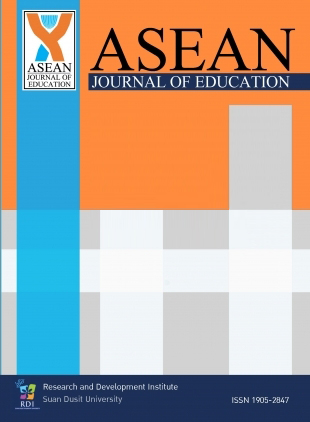Mathematical Problem-Solving Knowledge for Teaching in Context of Lesson Study: A Case Study of Mathematics In-service Teacher
Keywords:
Mathematical problem-solving knowledge for teaching, Lesson study, Teaching practice, Open approachAbstract
This study aimed to investigate an in-service mathematics teacher’s mathematical problem-solving knowledge for teaching in a Lesson Study context at the Theerakarn Banhong School, Lamphun Province, Thailand. The study employed a qualitative research methodology. The research used a case study approach of a mathematics in-service teacher who took charge as a member of the school’s lesson study team which was composed of 1) mathematics in-service teachers in the school and 2) coaches from a university to collaboratively work as participatory research design and was used as a method for a data collection. Collaboratively work on the Lesson Study cycle in the Thailand context (Inprasitha, 2011; 2015; 2022) of the lesson study team was recorded in a form of a videotape as evidence for content analysis (Bengtsson, 2016). Then, this evidence was analyzed in accordance with Mathematical Problem-Solving Knowledge for Teaching (MPSKT) (Chapman, 2015). Research results showed that the mathematics in-service teacher performed his teaching practice which manifests the MPSKT in accordance with the Lesson Study; 1) Collaboratively Plan, the teacher reviewed students’ how-to-learn and designed problem situations, identified students’ difficulties, and anticipated students’ ideas. Moreover, the teacher designed main and supporting materials to encourage students’ problematic states. 2) Collaboratively Do, the teacher supported students to utilize their own how-to-learn to solve problems which related to their experiences and the teacher encouraged students to solve problems by themselves. 3) Collaboratively See, the teacher reflected on clusters of students’ ideas and discussed each idea that was affected by the students’ how-to-learn. Moreover, the teacher reflected on conditions used in problem situations that related to students’ ideas, to enhance the problem situations for the next loop of the lesson study. MPSKT in each step of the Lesson Study was discussed. Additionally, the MPSKT supported his teaching practices for teaching mathematics through problem-solving.
References
Bengtsson, M. (2016). How to plan and perform a qualitative study using content analysis. NursingPlus Open, 2, 8-14.
Chapman, O. (2015). Mathematics Teachers’ Knowledge for Teaching Problem Solving. LUMAT (2013–2015 Issues), 3(1), 19-36.
Foster, C., Wake, G., & Swan, M. (2014). Mathematical Knowledge for Teaching Problem Solving: Lessons from Lesson Study. In Oesterle, S., Liljedahl, P., Nicol, C., & Allan, D. (Eds.) Proceedings of the Joint Meeting of PME 38 and PME-NA 36, Vol. 3. (pp. 97-104). Vancouver, Canada: PME.
Freudenthal, H. (1991). Revisiting Mathematics Education. China Lectures. Kluwer, Dordrecht: Springer.
Gainsburg, J. (2008). Real-world Connections in Secondary Mathematics Teaching. Journal of Mathematics Teacher Education, 11, 199-219.
Inprasitha, M. (2011). One Feature of Adaptive Lesson Study in Thailand: Designing a Learning Unit. Journal of Science and Mathematics Education in Southeast Asia, 34, 47-66.
Inprasitha, M. (2015). Transforming Education through Lesson Study: Thailand’s Decade-Long Journey. In M. Inprasitha, M. Isoda, P. Wang-Iverson, & B. H. Yeap (Eds.), Lesson Study: Challenges in Mathematics Education. (pp. 213-228). Singapore: World Scientific.
Inprasitha, M. (2022). Lesson study and open approach development in Thailand: A longitudinal study. International Journal for Lesson and Learning Studies, 11(5), 1-15.
Isoda, M. (2010). Lesson Study: Problem Solving Approaches in Mathematics Education as a Japanese Experience. Procedia Social and Behavioral Sciences, 8, 17–27.
Isoda, M., & Katagiri, S. (Eds.) (2012). Mathematical Thinking: How to Develop It in the Classroom. Singapore: World Scientific.
National Council of Teachers of Mathematics. (2000). Principles and Standards for School Mathematics. Reston: Author.
National Research Council. (1990). Reshaping School Mathematics: A Philosophy and Framework for Curriculum. Washington: National Academy Press.
Reys, R., Reys, B., Shimizu, S., & Iwasaki, H. (Eds.). (2012). Gateway to the Future: Math 1-3 for Junior School. Japan: Shinko Shuppansha Keirinkan.
Takahashi, A. (2021). Teaching Mathematics Through Problem-Solving. New York: Routledge.
Downloads
Published
How to Cite
Issue
Section
License

This work is licensed under a Creative Commons Attribution-NonCommercial-NoDerivatives 4.0 International License.
1 All articles will undergo a formal peer-review. A panel of experts from within or without the university will examine the article; approval from a minimum of two experts is required for publication. Revisions posed by the experts must be completed by the research prior to publication.
2 Once published in the ASEAN Journal of Education, the article becomes intellectual property of Suan Dusit University. Duplication, in full or part, requires permission from Suan Dusit University.
3 Excluding errors incurred during printing, author(s) are responsible for the content of their articles.






